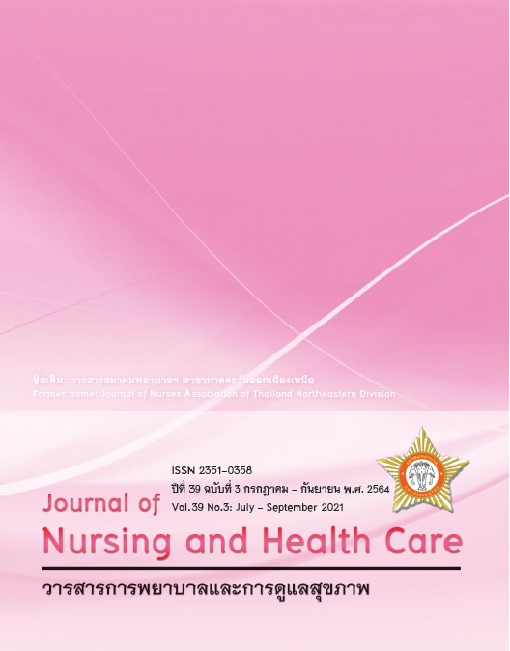ความเครียดในบิดามารดาของทารกที่เข้ารับการรักษา ในหอผู้ป่วยทารกแรกเกิดระยะวิกฤต
คำสำคัญ:
ความเครียด, บิดามารดาของทารกแรกเกิดที่เข้ารับการรักษาในหอผู้ป่วยทารกแรกเกิดระยะวิกฤต, หอผู้ป่วยทารกแรกเกิด, ระยะวิกฤตบทคัดย่อ
การวิจัยนี้เป็นการวิจัยเชิงพรรณนามีวัตถุประสงค์เพื่อศึกษาความเครียดในบิดามารดาของทารกที่เข้ารับการรักษาในหอผู้ป่วยทารกแรกเกิดระยะวิกฤต โรงพยาบาลระดับตติยภูมิ แห่งหนึ่งในภาคตะวันออกเฉียงเหนือ เครื่องมือวิจัย ประกอบด้วย แบบสอบถามข้อมูลส่วนบุคคลของกลุ่มตัวอย่าง และแบบสัมภาษณ์ประเมินความเครียดในบิดามารดาทารกที่เข้ารับการรักษาในหอผู้ป่วยทารกแรกเกิดระยะวิกฤต โดยแบ่งปัจจัยที่ก่อให้เกิดความเครียด 4 ด้าน คือ 1) สภาพแวดล้อมในหอผู้ป่วยทารกแรกเกิดระยะวิกฤต 2) ลักษณะและพฤติกรรมของทารกที่ปรากฏ 3) การเปลี่ยนแปลงบทบาทของบิดามารดา และ 4) ลักษณะและพฤติกรรมการสื่อสารของเจ้าหน้าที่ โดยผ่านการตรวจสอบเครื่องมือจากผู้ทรงคุณวุฒิ 3 ท่าน มีค่าดัชนีความตรงของเนื้อหา 0.89 ค่าสัมประสิทธิ์แอลฟ่าครอนบาร์คเท่ากับ 0.78 ซึ่งเก็บข้อมูลโดยการสัมภาษณ์บิดามารดาทารกแรกเกิดที่เข้ารับการรักษาในหอผู้ป่วยทารกแรกเกิดระยะวิกฤต กลุ่มตัวอย่างเลือกแบบเฉพาะเจาะจงตามคุณสมบัติ จำนวนทั้งหมด 90 ราย วิเคราะห์ข้อมูลโดยใช้ค่าสถิติเชิงพรรณนา เปรียบเทียบข้อมูลส่วนบิดามารดากับความเครียดในบิดามารดา และเปรียบเทียบข้อมูลส่วนทารกแรกเกิดกับความเครียดในบิดามารดา โดยใช้สถิติ Independent t-test
ผลการวิจัยพบว่า บิดามารดาทารกแรกเกิดระยะวิกฤตมีความเครียดด้านการเปลี่ยนแปลงบทบาทของบิดามารดา (x̄ =3.55, SD=0.61) อยู่ในระดับมาก บิดามารดามีความเครียดโดยรวมอยู่ในระดับปานกลาง ผลของการวิเคราะห์เปรียบเทียบพบว่ามารดากับบิดามีความเครียดไม่แตกต่างกัน อย่างมีนัยสำคัญทางสถิติที่ระดับ 0.05 ผลของการวิเคราะห์เปรียบเทียบความเครียดของบิดามารดากับข้อมูลด้านทารกแรกเกิดวิกฤตของบิดามารดา พบว่า บิดามารดาที่มีบุตรเป็นทารกเกิดก่อนกำหนดมีความเครียด (x̄ =74.78, SD=13.94) มากกว่าบิดามารดาที่มีบุตรเป็นทารกเกิดครบกำหนด /เกินกำหนด (x̄ =68.36, SD=13.12) อย่างมีนัยสำคัญทางสถิติที่ระดับ 0.05 จากการศึกษาพยาบาลในหอผู้ป่วยทารกแรกเกิดระยะวิกฤตควรให้การดูแลบิดามารดาเพื่อป้องกันภาวะเครียดที่รุนแรงในบิดามารดาให้ลดลงได้
Downloads
เอกสารอ้างอิง
URL: https://doi.org/10.5923/j.ijpbs.20170701.05
2. Burcu, C., Türkan. The stress levels of parents of premature infants and related factors in Nenoatal Intensive Care Units. The Turkish Journal of Pediatrics 2018; 60(2): 117-125.
3. Busakorn Punthmatharith and Natenapa Thepchana. Effects of Maternal Needs Preparation on Satisfaction and Anxiety of Mothers Having Premature Infants in the Neonatal Intensive Care Unit. Songklanagarind Journal of Nursing. 2013; 32 (2): May – August: 1-22.
4. Chanita Paesakul, and Chalida Thanattheerakul. Maternal Participation in Caring for High-Risk Neonates. The Journal of Boromarajonani College of Nursing, Nakhonratchasima. 2010; 16 (1): 39-49.
5. Columb, M.O., Fficm, Frca, Atkinson, M.S. and Fficm, Frca. Statistical analysis: sample size and power estimations. British Journal of Anesthesia Education. 2016; 16 (5): 159–161.
6. Ding, X., Zhu, L., Zhang, R., Wang, L., Wang, T. T., & Latour, J. M. Effects of family-centered care interventions on preterm infants and parents in neonatal intensive care units: A systematic review and meta-analysis of randomized controlled trials. Australian Critical Care. Elsevier Ireland Ltd.
2019; January: 1.URL: https://doi.org/10.1016/j.aucc.2018.10.007.
7. Gennaro, S. Postnatal anxiety and depression in mothers of premature infants. Nursing Research 1988: 37; 82-85.
8. Jagdish R. Varma, Somashekhar M. Nimbalkar and Ajay G. Phatak. The Level and Sources of Stress in Mothers of Infants Admitted in Neonatal Intensive Care Unit. Indian J Psychol Med 2019; Jul-Aug; 41(4): 338-342.
9. Jairaksa, S. Promote Technical Occupations 2017; Retrieved May 29: 2018. from URL: http://cddata.cdd.go.th/cddkm/prov/km2_viewlist.php?action=view&div=64&kid=28748.
10. Kanjana Punpanich. A study of postpartum maternal stress. Health Promotion Hospital Health Center region 5. 2562: 1-12. [Internet]. [cited 2019 Dec 10]; [about 12 p.]. https://hpc.go.th/rcenter/_fulltext/20190701151555_3493/20190701151623_3814.pdf.
11. Kruger, S.K. Parents in crisis; Helping them cope with a serious ill child. Journal of Pediatric Nursing 1992; 1: 133-139.
12. Mansson, C., Sivberg, B., Selander, B., & Lundqvist, P. The impact of an individualised neonatal parent support programme on parental stress: a quasi-experimental study. Scandinavian Journal of Caring Sciences; 2019. https://doi.org/10.1111/scs.12663.
13. Miles, M.S. Assessing parental stress in intensive care unit. MCN 1983.8(September/October): 354-359.
14. Ministry of Public Health of Thailand. HDC report. [Internet]. [cited 2019 Dec 10]; [about 1 p.].
available from: https://hdcservice.moph.go.th.
15. Nalinee Sitthiboonma, Kannika Kantaruksa and Bungorn Supavitipatana. Stress, Social Support and Postpartum Depression Among First-time Mothers. Nursing Journal. 2020; 47(2): 169-179.
16. Niyada Sophikul, Kuntima Kaoloung and Pornthip Kanungbutr. Development of Neonatal Critical Care System in Pathumthani Hospital. Journal of Nursing Division. 2015; 42 (1): 41-57.
17. Palma I., E., Von Wussow K., F., Morales B., I., Cifuentes R., J., & Ambiado T., S. Stress in parents of hospitalized newborns in a neonatal intensive care unit. Revista Chilena de Pediatria 2017; (3): 332–339. URL: https://doi.org/10.4067/S0370-41062017000300004.
18. Papangkorn Singkla. Effects of nursing mutual participation of mothers on maternal stress and role in caring for critical premature babies. Thesis for the Degree of Master of Nursing Science in Pediatric Nursing Graduate School Khon Kaen University; 2007.
19. Preeda Unsiam. Involvement of mothers in caring for a critically ill newborn Phatthalung Hospital. The Southern College Network Journal of Nursing and Public Health. 2017; 4: Special Issue April: 61-74.
20. Sunthorn horpaopan. Identification of High-Risk Neonate in E-Book Pediatric Newborn. The Royal College Pediatricians of Thailand. 2018; 1-7. [Internet]. [cited 2019 Dec 10]; [about 7 p.]. available from: http://www.thaipediatrics.org/Media/media-20180418145630.pdf.
21. Yosawimol Thinthip, Wanida Sanasuttipun and Parnnarat Sangperm. Comparisons of Needs and Response to Needs of Fathers of Premature Infants in Neonatal Intensive Care Unit as Perceived by Fathers and by Nurses. Journal of Nursing Science. 2017; 35(2), 15-27.
22. Woranat Junkajon, Wullapa Udchachon, Manussawee Phuntawasit, Kamonnuch Ketsakorn, Nisanart Cheerapun, Supatra Mhaichai, Document Annual Report 2018; Newborn Excellent Center, Khon Kaen Hospital; 2018.
23. Wanchanok Juntachum. Nursing research, sample selection and sample size determination: teaching materials. Department of Research Education and Nursing Administration, Faculty of Nursing Khon Kaen University; 2019.
24. Turner, M., Chur-Hansen, A., Winefield, H., & Stanners, M. The assessment of parental stress and support in the neonatal intensive care unit using the Parent Stress Scale– Neonatal Intensive Care Unit. Women and Birth 2015; 28(3): 252–258.
25. Suntaree Pinyomi. The relationship between factors that cause stress support from married couples to the mental adjustment of mothers after childbirth with sick children. Master of Nursing Thesis Nursing Science, Graduate school Mahidol University. 1995. DOI: https://doi.nrct.go.th/ListDoi/listDetail?Resolve_DOI=
26. World Health Organization. World Health Statistics. Retrieved 2017; October;2019: 1.
From https://www.who.int/gho/publications/world_health_s.
ดาวน์โหลด
เผยแพร่แล้ว
รูปแบบการอ้างอิง
ฉบับ
ประเภทบทความ
สัญญาอนุญาต
ลิขสิทธิ์ (c) 2021 วารสารการพยาบาลและการดูแลสุขภาพ

อนุญาตภายใต้เงื่อนไข Creative Commons Attribution-NonCommercial-NoDerivatives 4.0 International License.



